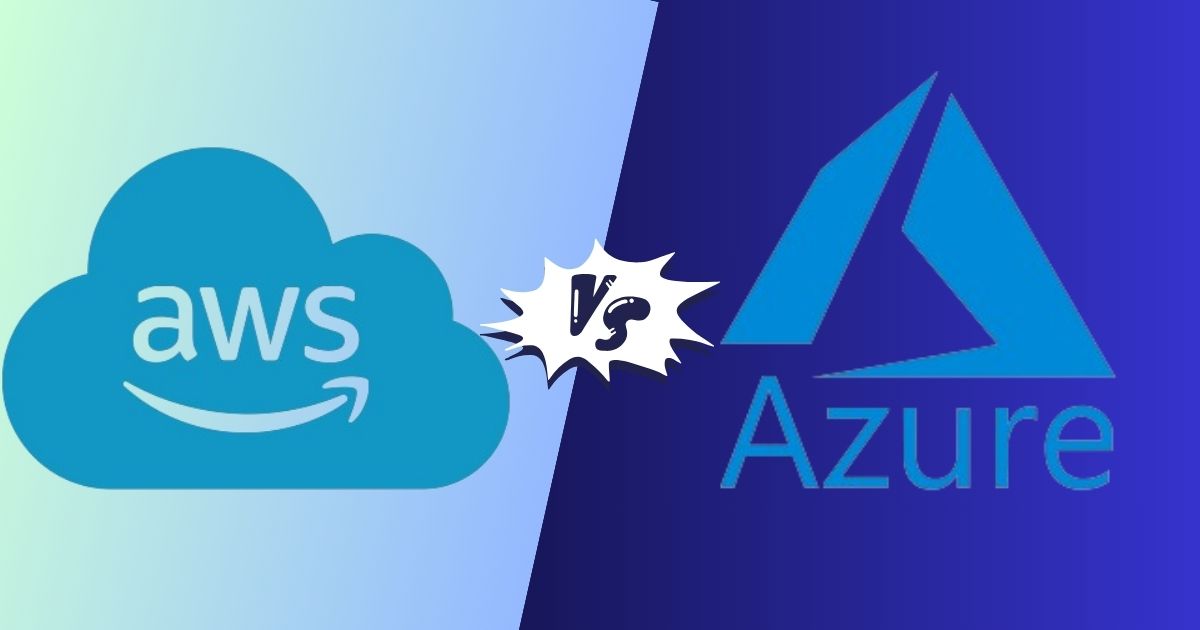AWS vs Azure: In the world of cloud computing, there are two big players: Amazon Web Services (AWS) and Microsoft Azure. They’re like the big department stores of the internet, offering all sorts of services to help businesses run their stuff online. But they have their own flavors and features.

AWS (Amazon Web Services) is like the online shopping giant Amazon, while Azure is like the tech powerhouse Microsoft.
Let’s take a peek at what each offers to help you figure out which one might be best for your needs.
Table of Contents
AWS vs Azure: Difference Between Top 2 Cloud Service Providers
| Factor | AWS | Azure |
|---|---|---|
| Parent Company | Amazon | Microsoft |
| Market Share | Largest market share in cloud services industry | Second-largest market share in cloud services industry |
| Regions | Available in more regions worldwide | Available in fewer regions worldwide |
| Compute Services | EC2 (Elastic Compute Cloud), Lambda, etc. | Virtual Machines, Azure Functions, etc. |
| Storage Services | S3 (Simple Storage Service), EBS (Elastic Block Store), etc. | Blob Storage, Azure Disk Storage, etc. |
| Database Services | RDS (Relational Database Service), DynamoDB, etc. | SQL Database, Cosmos DB, etc. |
| Market Position | Established with a longer history in the market | Rapidly growing and gaining market share |
| Enterprise Focus | Strong focus on enterprise customers | Strong focus on enterprise customers |
| Integration | Well-integrated with other AWS services | Well-integrated with other Microsoft products |
What Is AWS?
AWS (Amazon Web Services) is a leading cloud computing platform offering scalable infrastructure services like computing power, storage, networking, and databases. It provides on-demand access to resources without the need for upfront investment in hardware. AWS is widely used for its scalability, reliability, and extensive service offerings, catering to businesses of all sizes.
What Is Azure?
Azure is Microsoft’s cloud computing platform, offering various services like virtual machines, databases, and analytics over the internet. It provides flexibility, scalability, and reliability for building and managing applications without heavy upfront investment. Azure’s global network of data centers supports businesses of all sizes in innovating and scaling their operations efficiently.
Who Uses AWS and Azure?
Both AWS and Azure are utilized by a wide range of businesses, organizations, and individuals for various purposes. Here’s a list highlighting some of the key users of AWS and Azure:
| AWS Users | Azure Users |
|---|---|
| Netflix | BMW |
| Airbnb | Adobe |
| Spotify | Boeing |
| Honeywell | |
| NASA | Coca-Cola |
| Samsung | HP |
| Pfizer | 3M |
| GE | Chevron |
| Siemens | Maersk |
AWS: Pros and Cons
Pros
1.Extensive Service Portfolio: AWS boasts the widest range of cloud services, catering to almost any need imaginable, from storage and databases to machine learning and artificial intelligence.
2.Scalability and Flexibility: Easily scale resources up or down as your business demands change. This allows you to pay only for what you use, making it cost-effective for businesses of all sizes.
3.Mature Platform: With its long history, AWS offers a stable and reliable environment with a proven track record.
4.Security: AWS prioritizes security and offers robust features to keep your data safe. They are constantly innovating and improving their security measures.
Cons
1.Complexity: The sheer number of services can be overwhelming for beginners. Navigating the vast array of options and finding the right service for your specific needs can be a challenge.
2.Vendor Lock-In: While AWS offers a wide range of services, relying heavily on them can limit your flexibility in the future. If you become heavily invested in their ecosystem, switching to another provider can be complex and expensive.
Azure: Pros and Cons
Pros
1.User-Friendly: Azure is generally considered easier to learn and navigate compared to AWS, especially for those already familiar with Microsoft products. The interface is designed to be more intuitive.
2.Cost Optimization: Offers features like Azure Reserved Instances for predictable pricing, helping you avoid unexpected charges.
3.Strong Hybrid Cloud Support: Azure excels at integrating with existing on-premises infrastructure, making it a perfect choice for businesses that want to move gradually to the cloud.
4.Tight Microsoft Integration: Seamless integration with Microsoft products like Office 365 and Active Directory, streamlining workflows for Microsoft-centric businesses.
Cons
1.Limited Service Portfolio: Compared to AWS, Azure has a somewhat smaller range of services. You might not find the exact niche service you need.
2.Vendor Lock-In: Relying heavily on Azure services and integrating them heavily with Microsoft products can limit your flexibility in the future. Switching to another provider might be complex and expensive.
3.Regional Performance: Azure’s performance can vary depending on your location. While it has a global presence, some regions might have slower connection speeds.
Read More : Top 10 Cloud Service Providers In 2024
FAQ: AWS vs Azure
1.Which one is more popular, AWS or Azure?
AWS currently holds the largest market share in the cloud services industry, followed by Azure.
2.How do I choose between AWS and Azure?
The choice between AWS and Azure depends on factors like the type of services needed, existing infrastructure, budget, and integration requirements. It’s essential to evaluate both platforms based on your specific needs.
3.Are AWS and Azure secure?
Both AWS and Azure offer robust security features and compliance certifications to protect data and applications. They follow industry best practices and provide tools for managing security.
4.Can I migrate my existing applications to AWS or Azure?
Yes, both AWS and Azure offer tools and services to facilitate the migration of applications from on-premises or other cloud platforms. It’s important to plan and execute the migration carefully to ensure a smooth transition.
